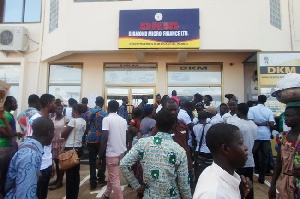 DKM Diamond Micro-finance Company
DKM Diamond Micro-finance Company
The Central Bank is looking for a commercial bank that will buy the deposit liabilities of the embattled DKM Diamond Micro-finance Company in a debt-buy-back scheme.
The Bank of Ghana (BoG) needs the money to pay investors and depositors who have lost funds to the microfinance company.
Abdul Nashir Issahaku, Governor of BoG, who disclosed this recently at a press briefing in Accra, said “efforts are being made to pay depositors their original deposits so someone has to start making payments even as the liquidation process continues, because submitting the audit report is just one step.”
“We may then have to go into selling the assets and that may take over a year and the poor farmer, for example, whose money is locked, cannot wait for a year to get a fertilizer. Someone has to pay,” he explained.
Dr. Nashir Issahaku said his outfit was considering the payment process with the numerous options open to it.
“One option is a debt buy-back approach whereby any commercial bank interested in buying the debt can start to make payment once the audit results come back.”
He said any commercial bank that agreed to a possible buy-back deal would assume the debts at a discounted cost, an investment the Central Bank believes will be realized from the sale of DKM’s assets.
“So, for instance, if the debt is GH¢100 million they could buy it for GH¢70 million – and that is important because going directly as Central Bank to make payment raises issues of moral hazard,” the Governor said.
Assets Liquidation
According to Dr. Issahaku, the Central Bank intends to use the sale of assets to make up for the shortfall in paying depositors since the money that was diverted and the funds in DKM accounts could not offset the company’s liabilities to depositors.
“As you know, we are not going to reward the reckless behaviour of DKM customers. The other thing is to make sure that DKM is accountable for the losses of depositors, and that means they have to pay for it, and there is a process which requires that their assets are liquidated. Once you liquidate the assets, based on what you get, you use it to pay the liabilities.
Challenge
“Now the challenge is establishing the true financial status of DKM — how much assets it has as against its liabilities as discovered in the books and how to verify the amount depositors claim to have lost, and all that is necessary before payment can be made to the depositors. So the Registrar-General’s Department, the official liquidator has to establish that,” he said.
Audit
Dr. Nashir Issahaku said PwC has been contracted to undertake a forensic audit to establish the true financial position of DKM and also validate the identities and original deposits separate from accumulated interest payment of depositors.
“We discovered in the initial stages of the forensic audit that there were some other assets that were not originally captured in the first audit we did internally, and so it may well be that there are more assets than we think.”
BoG initial intervention
DKM licence was revoked after the Central Bank discovered that the company violated all regulatory rules governing operations in the sector.
The Central Bank subsequently placed a 90-day moratorium on operations of the company and further went ahead to revoke its licence after an investigation by the Financial Intelligence Centre of the Central Bank indicated that the company at the time of the moratorium had a total deposit liability of GH¢115.2 million. However, it only had GH¢10.8 million in its accounts.
Additionally, a forensic audit commissioned by the Central Bank into the books of DKM established that the company diverted GH¢77.26 million to subsidiary companies – DKM Mining Ltd., DKM Transport Ltd., DKM Shea Butter Ltd., DKM Gas Filling Station and DKM Cement Depot Ltd.